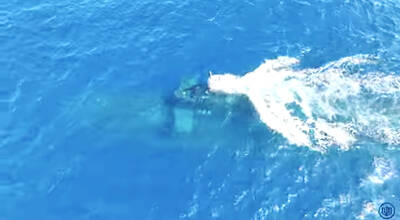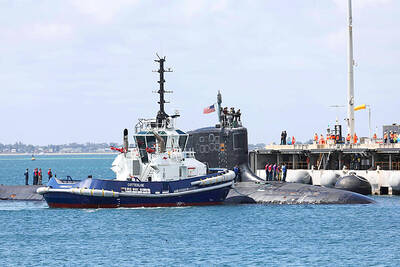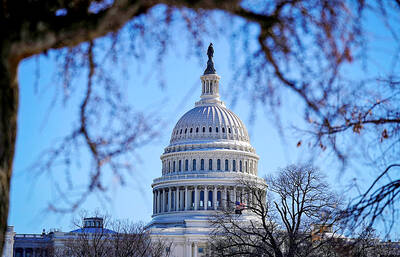Democratic Progressive Party (DPP) Tainan City Councilor Wang Ting-yu (王定宇) was indicted yesterday for inciting supporters to use violence against Association for Relations Across the Taiwan Strait (ARATS) Vice Chairman Zhang Mingqing (張銘清) during his visit to Taiwan last week, with prosecutors suggesting a 14-month jail sentence.
Zhang was allegedly jostled by Wang and several pro-independence supporters during a private visit to Tainan’s Confucius Temple. In the melee, Zhang fell to the ground and was slightly injured.
“Video footage from the scene proves that Wang pushed Zhang and that made him fall. The actions of Wang and his supporters damaged Taiwan’s image,” Tainan District Prosecutors’ Office spokesman Lee Ching-wen (李靜文) said.
Six of Wang’s supporters present at the protest on Oct. 21 were also indicted.
Wang was indicted on charges of intimidation and assault.
Prosecutors also said that Lin Chin-hsun (林進勳), who jumped on the roof of Zhang’s car, should receive an eight-month sentence; while Tu Yung-nan (杜永南), Tseng Chao-chi (曾朝枝), Wu Ping-chin (伍平進) and Wang Chen-juei (王貞瑞) should be given six months each for trying to block Zhang’s car by standing in front of it.
Seventy-year-old Ho Kuei-hua (何桂花) was indicted for trying to attack Zhang by hitting his car with a crutch.
Prosecutors asked for a six-month sentence for her.
The six were indicted on charges of intimidation and interference and for “overthrowing” democratic values.
“Obviously, politics are interfering with our judicial system. The authorities have taken advantage of this incident to flatter the Chinese government, especially as it took less than one week for prosecutors to wrap up the case,” Wang said.
Wang made his remarks after learning of his indictment yesterday morning. He said he would cooperate and help prosecutors with their investigation, but accused prosecutor Su Tsung-jung (蘇聰榮), who is leading the case, of allowing politics to influence his actions.
“ARATS Chairman Chen Yunlin (陳雲林) is visiting Taiwan next week. I will still organize my supporters in protest at his visit, as I am afraid we will not have the chance to do so in future,” Wang said.
The DPP caucus also criticized the indictments at a press conference at the legislature yesterday morning.
“Shame on you,” DPP Legislator Chiu Yi-ying (邱議瑩) said before leaving the room.
“This is such a nice gift for China before Chen’s visit,” DPP Legislator Kuan Bi-ling (管碧玲) said.
DPP Legislator Chen Ting-fei (陳亭妃) asked prosecutors to prove they could be as efficient in other cases by completing their investigation and making indictments in the alleged blackmailing of Wang by gangsters.
“This [Wang’s indictment] was wrapped up in just nine days. We hope to see somebody indicted for blackmailing Wang within nine days as well,” she said.
At a separate press conference at DPP headquarters, the party requested that the video footage used for the indictment be made public.

CSBC Corp, Taiwan (台灣國際造船) yesterday released the first video documenting the submerged sea trials of Taiwan’s indigenous defense submarine prototype, the Hai Kun (海鯤), or Narwhal, showing underwater navigation and the launch of countermeasures. The footage shows the vessel’s first dive, steering and control system tests, and the raising and lowering of the periscope and antenna masts. It offered a rare look at the progress in the submarine’s sea acceptance tests. The Hai Kun carried out its first shallow-water diving trial late last month and has since completed four submerged tests, CSBC said. The newly released video compiles images recorded from Jan. 29 to

DETERRENCE EFFORTS: Washington and partners hope demonstrations of force would convince Beijing that military action against Taiwan would carry high costs The US is considering using HMAS Stirling in Western Australia as a forward base to strengthen its naval posture in a potential conflict with China, particularly over Taiwan, the Wall Street Journal reported on Saturday. As part of its Indo-Pacific strategy, Washington plans to deploy up to four nuclear-powered submarines at Stirling starting in 2027, providing a base near potential hot spots such as Taiwan and the South China Sea. The move also aims to enhance military integration with Pacific allies under the Australia-UK-US trilateral security partnership, the report said. Currently, US submarines operate from Guam, but the island could

RESTRAINTS: Should China’s actions pose any threat to Taiwan’s security, economic or social systems, China would be excluded from major financial institutions, the bill says The US House of Representatives on Monday passed the PROTECT Taiwan Act, which states that Washington would exclude China from participating in major global financial organizations if its actions directly threaten Taiwan’s security. The bill, proposed by Republican Representative Frank Lucas, passed with 395 votes in favor and two against. It stipulates that if China’s actions pose any threat to Taiwan’s security, economic or social systems, the US would, “to the maximum extent practicable,” exclude Beijing from international financial institutions, including the G20, the Bank for International Settlements and the Financial Stability Board. The bill makes it clear that China must be prepared

Taiwanese trade negotiators told Washington that Taipei would not relocate 40 percent of its semiconductor production to the US, and that its most advanced technologies would remain in the nation, Vice Premier Cheng Li-chiun (鄭麗君) said on Sunday. “I told the US side very clearly — that’s impossible,” Cheng, who led the negotiation team, said in an interview that aired on Sunday night on Chinese Television System. Cheng was referring to remarks last month by US Secretary of Commerce Howard Lutnick, in which he said his goal was to bring 40 percent of Taiwan’s chip supply chain to the US Taiwan’s almost